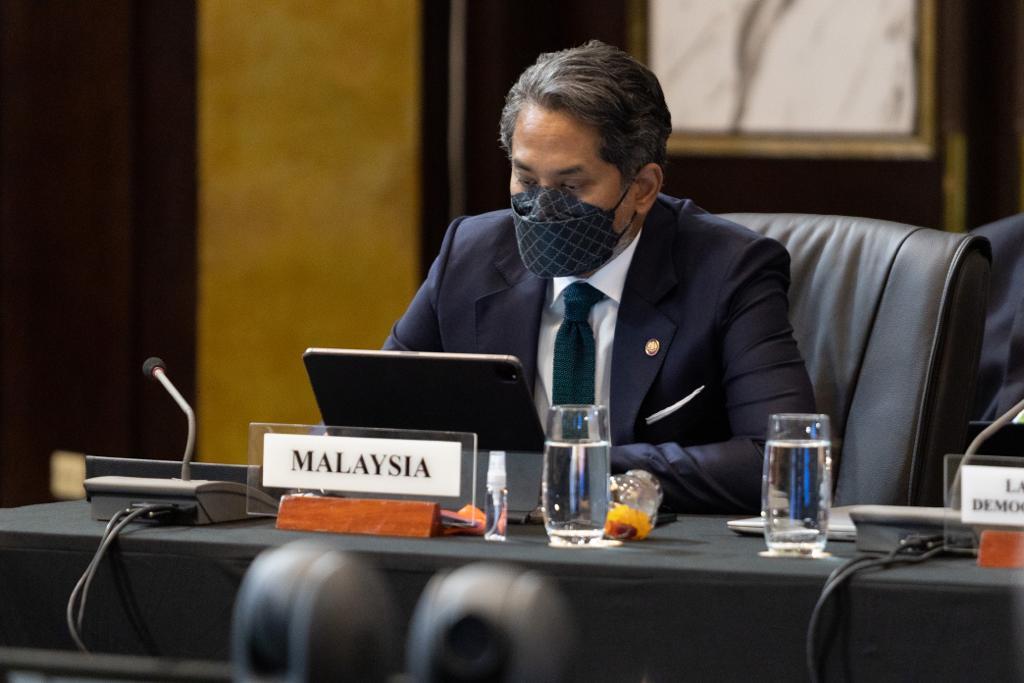KUALA LUMPUR, Oct 25 – People are likely to adopt more positive health behaviours in a global health crisis such as the Covid-19 pandemic than they are outside an emergency.
Caretaker health minister Khairy Jamaluddin described crises as outliers that make it easier for people to behave in a certain way such as staying at home, wearing masks, checking in, and getting vaccinated against Covid-19.
“We had a million people taking the AstraZeneca jab at a time when there were concerns about it having unintended thrombosis or blood-clotting events, but people signed up for it because it was a crisis.
“Now, of course, it is very difficult to behave in a certain way when you transition towards more normal circumstances. So, for instance, in Malaysia, our adult Covid-19 vaccination rate for two doses is 98 per cent but for the second booster dose i.e. the fourth dose, it is only 2.2 per cent, and that’s because people don’t see it as a crisis anymore,” Khairy said at the World Health Organization’s (WHO) 73rd Western Pacific Regional Committee Meeting in Manila, Philippines, today.
There was also near-perfect compliance with masking at the height of the Covid-19 crisis simply because “it was life or death for many people”, Khairy said.
“But norms which are outside of a crisis environment are difficult to change – for instance, smoking. We have a ban on smoking in public places and unfortunately, we have to fine people because social norms have not really taken root when it comes to things which are not in a crisis environment,” Khairy said.
Attitudes also shifted on the use of MySejahtera as a Covid-19 app, Khairy said, with concerns over data protection and privacy increasing as Malaysia moved towards endemicity.
“The ugly side of digital health is that people are now scared of using it. They were willing to use it during the crisis but they are now concerned about data breaches, insurance being rejected because private information may be leaked out about their health condition,” Khairy said.
Nevertheless, Khairy said lessons on behavioural science from the Covid-19 pandemic can be applied to tackle ongoing health issues such as the non-communicable diseases (NCDs) epidemic that affect many countries in the Western Pacific region, including in Malaysia.
This includes clear messaging at the authority level, actionable information using simple infographics, using varied approaches such as mosque sermons to overcome vaccine hesitancy, expanding the use of existing technology, and being transparent with data.
In addressing NCDs in Malaysia, Khairy highlighted that the country’s Peka B40 health screening programme, despite being free for nearly six million people, only has an uptake rate of 12 per cent.
Among reasons attributable to the low uptake rate was lack of health seeking behaviour within the targeted group, “complicated communications” that were not in the vernacular language that made information inaccessible to the targeted population, and a general reluctance to go for health screenings due to Covid-19.
“For our health screening initiative (for NCDs), when we’re transitioning out of Covid, we decided that we want to make sure that at least 1.5 Malaysians go through the national health screening programme by the end of this year.
“We realised that there was a small baseline during Covid simply because people didn’t go for their health screenings. We wanted to make sure we caught up with the new baseline of where we are in terms of NCDs.
“So we need to make up the intentions so the scary data was available to the Ministry of Health (MOH) and we needed to post that and tell the public, ‘Look, we have an increasing burden of NCDs post-Covid and we need to do something about it.’
“Second is to bridge those services to make it easy and actionable for them. So what we did was we repurposed our Covid app to become a national public health app. We pushed out not vaccination appointments but rather, health screening appointments.
“And of course link this to the big picture which is linking the data, using the data, the nudges towards keeping 10 million Malaysians healthy who would otherwise fall sick over the next 10 years,” Khairy said.
Another behavioural science approach that the government is attempting to implement to address NCDs in Malaysia is to turn health care into a culture, such as creating a smoke-free generation.
“It’s important to create a social norm. As I mentioned earlier in my intervention, now we are trying to tackle smoking to make sure that we have legislation where we can’t sell cigarettes to people born from 2007.
“My contention is if you have a social norm, you have solidarity where everyone after 2007 says we are part of a smoke-free generation, we’re not supposed to smoke, then that creates incentives in behaviour for people in that generation to be part of that social norm and say, ‘Look, we just don’t smoke anymore because we are born up to 2007.’
“So create it into a culture, into a national solidarity, and the behaviours will change,” Khairy said.








